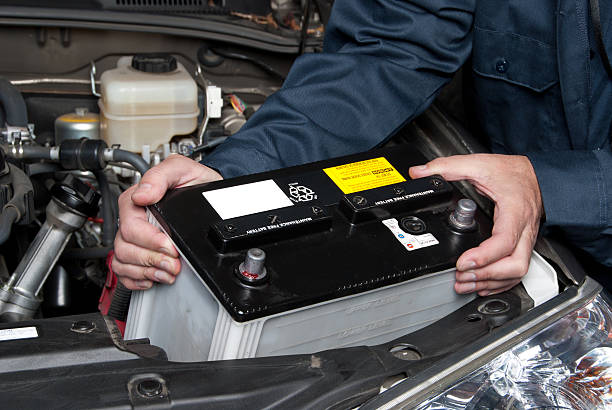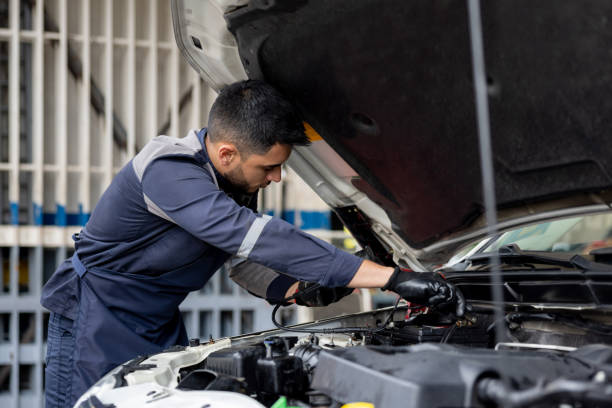
The amount Jiffy Lube charges for battery replacement varies from one location to another. This is often due to factors such as regional pricing differences and local market competition, and also the type / brand of the battery being installed, additional services and warranties offered by the specific Jiffy Lube franchise you are going to.
Jiffy Lube’s Battery Maintenance Services
Jiffy Lube offers a comprehensive battery and spark plug change services to its customers including:
Battery Replacement
They visually inspect the battery and test its cranking amp capacity, connect an external power source to prevent memory loss in digital systems (if needed). Then they remove the old battery and replace it with a new one.
Battery Terminal Cleaning
The technician will inspect the battery cable terminals, cleaning them and coat them with protective spray to prevent corrosion.
Battery Terminal Replacement
Jiffy Lube will visually inspect the battery cable terminals and, if necessary, replace them after cleaning the battery posts.
Battery Diagnostics
Their techs will test various components of the vehicle’s starting and charging system such as the battery’s cranking amp capacity, the starter’s electrical draw, and the alternator’s electrical output.

Common Signs Your Car Battery Needs to Be Replaced
While the general rule of thumb is to replace it every three to five years, it’s essential to follow the maintenance schedule recommended by your vehicle’s manufacturer. Here are some signs that your battery might need replacement:
- Check Engine Light or Battery Light Illuminated
- Problems with Electrical Component Operation
- Dim Headlights and Interior Lights
- Slow Engine Crank
- Clicking Sound When Starting
WHAT TO CONSIDER WHEN SELECTING A CAR BATTERY?
Picking the right car battery can feel daunting with all the technical terms thrown around. Let me simplify it a bit.
Battery Group
The BCI group determines the size, voltage, and terminal positions of the battery. Match it with your vehicle’s specs in the owner’s manual to ensure compatibility.
Cold Cranking Amps (CCA)
CCA indicates how well the battery performs in low temperatures. Higher CCA means better starting power, which matters even if you don’t face freezing temperatures regularly.
Reserve Capacity
This measures how long the battery can power your vehicle without assistance from the charging system. A higher reserve capacity means the battery can provide power independently for a longer duration.
HOW LONG DO CAR BATTERIES TYPICALLY LAST?
Usually, car batteries have a lifespan of around three to five years, but some factors can influence this timeframe significantly – severe weather conditions, frequent short drives, and parasitic draws.
You can locate the manufacturing date of your battery on a label positioned on its side or top. While most date labels are straightforward, some might use an alphanumeric code. In such cases, focus on the initial segment of the code: keep an eye out for a letter and a number. Letters are assigned to each month in sequence — for instance, A denotes January, B for February, and so on. The following number indicates the last digit of the year, such as 9 for 2019 and 3 for 2023.
CAN A FAULTY BATTERY IMPACT THE STARTER?
Absolutely. To put this in perspective, let’s say one of your ankles is weak. You compensate by relying more on the other one right? This adds strain to the other ankle. The same goes for batteries. When your battery begins to weaken, your starter motor might need to put in extra effort to kickstart your vehicle.
WHY DO CAR BATTERIES STOP WORKING?
There are several possible reasons:
- Age – Like most things, batteries wear out over time. After around 3 to 5 years, the components inside your battery start to break down, leading to decreased charge capacity and an inability to hold a charge.
- Extended Periods of Inactivity – If your car sits idle for an extended period (usually between 6 weeks to 6 months), the battery may lose its charge and need to be recharged. Also if a car battery remains completely drained for an extended time, its lifespan may be permanently shortened.
- Faulty Alternators – A dead battery could also indicate a failing alternator. If the alternator isn’t generating enough power to recharge the battery as quickly as it’s being depleted, the battery may discharge completely.

In a Nutshell
If it’s time to have your car battery replaced, contact your local Jiffy Lube service center to inquire about how much a battery or Wiper Blade replacement costs in their shop.